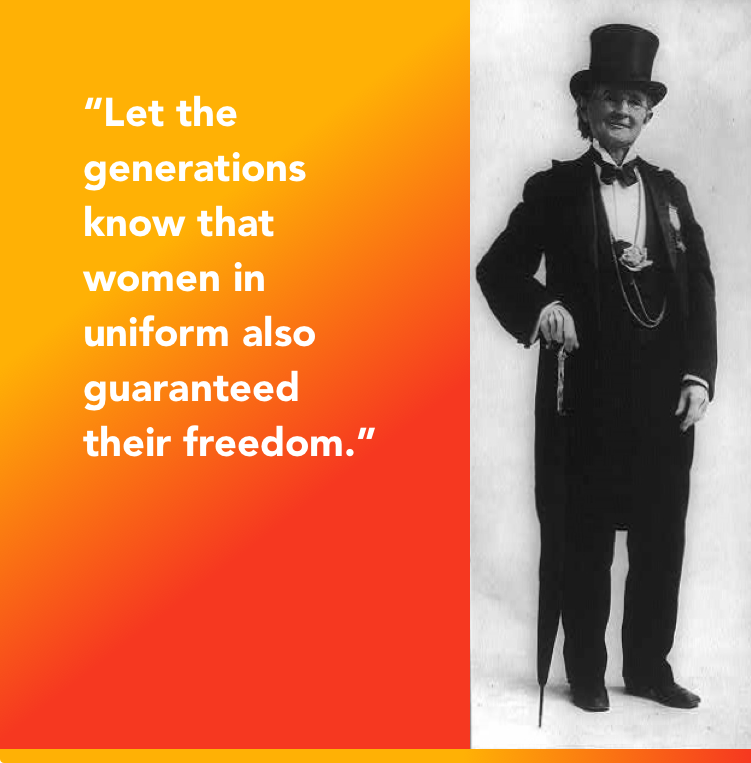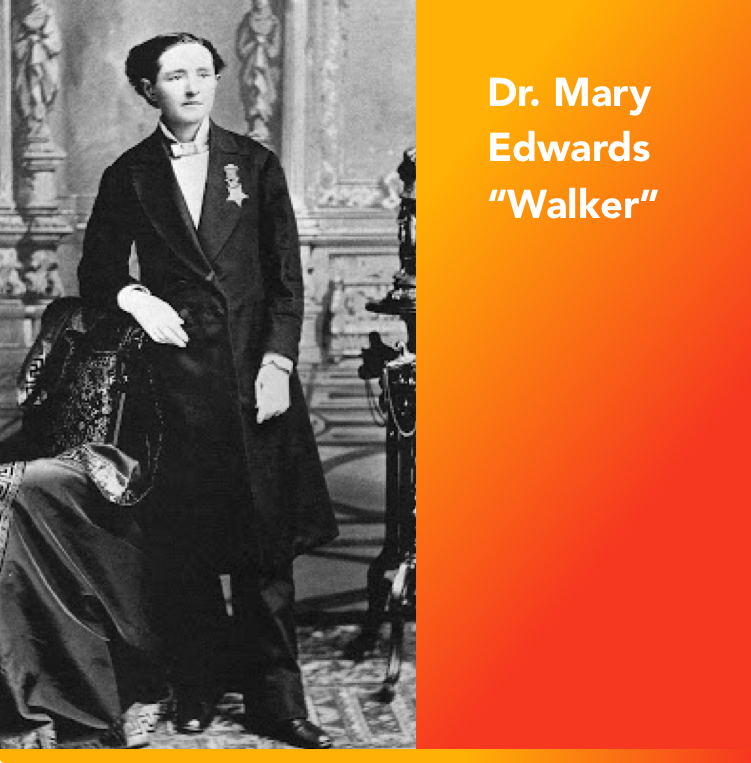As part of Whitman-Walker’s 40th anniversary, officially January 13, 2018, we’re sharing 40 stories to help tell the narrative of Whitman-Walker in community. We wanted to start by telling you how we landed on our name. Last week you met Walt Whitman, now please meet Dr. Mary Edwards Walker!
The “Walker” in Whitman-Walker Health is inspired by, and pays tribute to, Dr. Mary Edwards Walker, the second woman to graduate from medical school in the United States, and the only woman to have ever received the Medal of Honor. Dr.Walker was also known for her unique style as she often wore trousers, top hats and a “man’s” coat, something the 19th and 20th-century publics couldn’t always make sense of. Dr. Walker was arrested for her clothing on many occasions, and found pride in the arrests.
Born into an abolitionist family, during the U.S. civil war Dr. Walker traveled to Washington, DC to enlist in the Union Army. She was initially denied an officer’s position because she was a woman. Instead, she volunteered her time as an assistant surgeon in Union Army hospitals and often provided care on the front lines.
Dr. Walker’s commitment to care and community in the face of gender and sex discrimination align with our work at Whitman-Walker. Rooted in saving lives and fighting stigma, Whitman-Walker learned to care for people with compassion and dignity when resources were scarce, and fear and bias were plentiful. Dr. Walker’s dedication to never be defined by set expectations of her gender set her ahead of her time.
A vocal advocate for women’s rights, Walker is noted as saying “The recognition of the individuality of woman, is simply an acknowledgment of human rights, which all human beings have guaranteed them, by the fact of their having an existence; as surely is this, as is the right to exist at all.”

This is an excerpt from pages 110-111 of her book “Hit: Essays on Women’s Rights.” You can access the free online book here!
Facts about Dr. Mary Edwards Walker and her Medal of Honor:
- After serving in the Civil War, she was the first woman awarded the Medal of Honor. It was later taken back in 1917 when the criteria for receiving the medal was updated to only include persons “in actual combat with an enemy.”
- Dr.Walker refused to return her medal and instead wore it every day until her death in 1919. Her refusal to return the medal was a federal crime.
In 1977, President Jimmy Carter reinstated her medal stating her “distinguished gallantry, self-sacrifice, patriotism, dedication and unflinching loyalty to her country, despite the apparent discrimination because of her sex.”

Four Quotes by Dr. Mary Edwards Walker:
On Reasoning:
“A woman reasons by telegraph, and his [a man’s] stage-coach reasoning cannot keep pace with hers.”
On Achieving Happiness:
“You must come to terms with the reality that nothing outside ourselves, be it people or things is actually responsible for our happiness.”
On History & Freedom:
“Let the generations know that women in uniform also guaranteed their freedom.”
On Politics:
“Struggle for political rights, for it is through such, and such alone, that you will ever obtain human rights. It is not simply for yourself,
but for that great army of young women, who cannot yet see the necessity for anything but smiles and gallantry from the future husbands.”
Another excerpt from her book “Hit: Essays on Women’s Rights” (pages 1212-122)
In 1982, the U.S. Postal Service issued a stamp commemorating “Dr. Mary Walker, Army Surgeon,” the only woman to have been awarded the Medal of Honor and only the second woman to graduate from a medical school in the United States. Ironically, the stamp portrays her wearing a frilly dress and curls.
More Reading on Dr. Mary Edwards Walker
Meet Dr. Mary Walker: The only female Medal of Honor recipient (U.S. Army, March 2017)
Mary Walker’s Quest to be Appointed as a Union Doctor in the Civil War (The Atlantic, February 2013)


